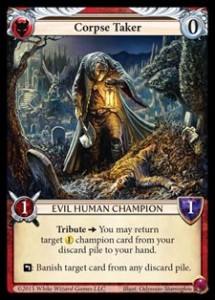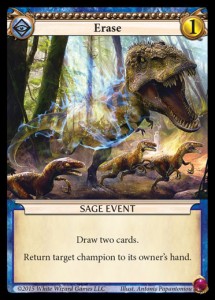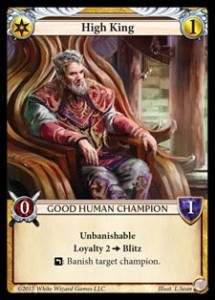- This is a guest blogpost by Josiah Fiscus. Josiah Fiscus is a 31-year-old gamer from Pittsburgh, PA who has been playing CCGs and designer board games for over two decades. When he’s not at the game table, you’ll find him playing drums and serving as a deacon in his local church or enjoying time outdoors with his wife, Erin, and two kids (ages 5 and 3).
The mulligan rules in Epic are wonderfully flexible compared to many other card games of this ilk. Whereas many other games demand a player either keep the entire hand or else redraw the entire hand, Epic allows for much more granular decision making. In light of that, let’s examine a few principles that will make you better at mulligans and consequently improve your win rate in general.
Principle 1: Your health total is a non-factor. You should never be afraid of the health loss penalty when considering a mulligan decision. The difference between starting at 30 health vs. 25 health in a game where single champions can hit for 30 is negligible. Moreover, drawing the card you need to answer your opponent’s threat a turn earlier will generally prevent you from losing FAR more health than you would have by not having the ans
 wer on time.
wer on time.Principle 2: Consider gold and speed. If your entire opening hand consists of “slow” cards (1-cost cards that are not Events and don’t have Ambush), you almost certainly want to send 2 (or more) of those cards to the bottom. If your opening hand is all slow cards, it will be the fifth turn of the game before you even have the possibility of playing the final card from your opening hand. Moreover, you will be drawing at least 4 more cards during that time, some of which are likely to be slow cards as well. It is the most efficient use of your gold (and thus often the best decision) to spend your gold on both your turn and your opponent’s turn, so make sure your hand provides the ability to do this.
Principle 3: You need both threats and answers. You want to have a first turn play that will start to put pressure on your opponent. Ideally, they will want to spend their answer card on it as soon as possible. Make sure you have a follow-up threat for the turn after as well. Punish your opponents for keeping opening hands that do not have answers to your threats. Conversely, don’t let your opponent catch you with a hand full of slow threats and no interaction with their champions. You want a minimum of 1 (and ideally 2) cards that can banish/break/return opposing champions. Cards like Kong, which function as both a powerful answer and a powerful threat are excellent cards to keep in your opener.
Principle 4: Get rid of cards you won’t use in the first couple turns. Yes, even if they are powerful. You should not be keeping cards in your opening hand that have abilities like Recycle or that
 return cards to your hand from the discard pile (like CorpseTaker); you will not be able to take full advantage of them right now. If there are cards with Loyalty abilities, but you don’t have the cards to trigger the Loyalty, either mulligan the Loyalty card or aggressively mulligan other cards in your hand so you can achieve the Loyalty trigger on time. Additionally, it could be argued that you probably don’t want “sweeper” cards right now (cards that banish, break, or return multiple champions) as they will provide more benefit in the late game. However, the current sweeper cards in game all have the option to draw 2 cards instead, which brings us to the next principle.
return cards to your hand from the discard pile (like CorpseTaker); you will not be able to take full advantage of them right now. If there are cards with Loyalty abilities, but you don’t have the cards to trigger the Loyalty, either mulligan the Loyalty card or aggressively mulligan other cards in your hand so you can achieve the Loyalty trigger on time. Additionally, it could be argued that you probably don’t want “sweeper” cards right now (cards that banish, break, or return multiple champions) as they will provide more benefit in the late game. However, the current sweeper cards in game all have the option to draw 2 cards instead, which brings us to the next principle.Principle 5: Don’t mulligan events that draw 2 cards. Events with t
 he ability to spend a gold for 2 cards are almost always sensible to keep in your hand. At worst, they effectively function as a double mulligan, getting you 2 cards instead of the 1 you would have gotten by sending it to the bottom, and you are likely to have opportunities to play these on an opponent’s turn when you do not need your gold. Of course each one also provides the flexibility to be used for something else as well. A card like Erase, which both draws cards AND functions as an answer, should never be mulliganed. That said, there is diminishing marginal utility in having lots of these. If I had all three of my Erase cards in my opener I’d keep them all, but the same is certainly not true for a hand with all three Amnesia cards.
he ability to spend a gold for 2 cards are almost always sensible to keep in your hand. At worst, they effectively function as a double mulligan, getting you 2 cards instead of the 1 you would have gotten by sending it to the bottom, and you are likely to have opportunities to play these on an opponent’s turn when you do not need your gold. Of course each one also provides the flexibility to be used for something else as well. A card like Erase, which both draws cards AND functions as an answer, should never be mulliganed. That said, there is diminishing marginal utility in having lots of these. If I had all three of my Erase cards in my opener I’d keep them all, but the same is certainly not true for a hand with all three Amnesia cards.Principle 6: Break these rules when warranted. If you know your opponent is playing a deck with tons of token
 generation, keeping sweeper cards in your opening hand is probably the right thing to do. Keeping a card like High King when you can’t get the Loyalty to trigger could still be the right thing to do, as it is powerful even without Blitz. If you have an opening hand full of zero-cost aggressive Blitz champions, maybe you don’t need to mulligan to find an answer card. Most of all, be aware of the general makeup of your deck and what cards you are likely to draw, both when you mulligan, and in future turns. Similarly, be aware of what your opponent’s deck is attempting to do. Those two pieces of information will guide you in when the right time is to go against this advice.
generation, keeping sweeper cards in your opening hand is probably the right thing to do. Keeping a card like High King when you can’t get the Loyalty to trigger could still be the right thing to do, as it is powerful even without Blitz. If you have an opening hand full of zero-cost aggressive Blitz champions, maybe you don’t need to mulligan to find an answer card. Most of all, be aware of the general makeup of your deck and what cards you are likely to draw, both when you mulligan, and in future turns. Similarly, be aware of what your opponent’s deck is attempting to do. Those two pieces of information will guide you in when the right time is to go against this advice.

Recent Comments